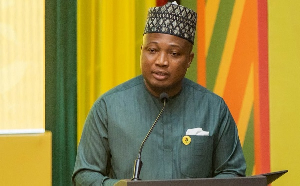Part 1
By Kwesi Atta Sakyi
17th June 2012
When the question is posed, ‘hat type of leadership style do Ghanaians want?’ I think the best answer is, ‘It depends on the situation, the mood of Ghanaians at any particular time, their aspirations, expectations and their experiences of other countries, especially for those of us in the Diaspora. The leadership calculus is a complex of variables so numerous to desegregate and analyse. Some political leaders prefer a low profile approach whereby they take a backseat and are rarely in the limelight. That is not visible leadership because a leader should be seen, heard and perceived as being sensitive to the plight of citizens. There are other leaders who are vociferous, visible, and always in the front seat, directing and taking charge, as it were, as if he were a driver of a Yutong bus. One may ask, ‘When is a leader not a leader?’, it is when the leader shirks his responsibilities and he becomes a dealer instead of a leader, engaging in wheeling and dealing. This is the point of departure between politically correct leadership, vis-à-vis ethically acceptable behavior on the one hand, and on the other hand, morally bankrupt leadership which can best be described as leadership failure, leadership arrest or capture and amoral concupiscence. When one surveys the political, social, economic, technological and physical landscapes of Ghana, one is bound to perceive a plethora of national problems, foremost among them are:-
1. Joblessness of youthful graduates
2. Political disquiet due to senseless vituperations and altercation in the media by senseless goons.
3. High Cost of living due to low productivity principally in the agricultural sector
4. Declining standards in the quality of healthcare and educational services delivery.
5. High levels of corruption in government circles in the award of contracts and application of external loans
6. Increase in crime wave in the country
7. Proliferation of fake churches where the poor gullible masses are fleeced by charlatan bishops, priests, pastors and so called pretenders in the churches.
8. Increase in tribal hatred due to unguarded statements of some careless and spineless politicians.
9. Poor implementation and articulation of government policies e.g., SADA
10. High decibels of media din and cacophony, causing the low esteem of those in the fourth estate in Ghana.
11. Proliferation of fatuous and bogus academic and religious credentials. Man so-called professors and PhD holders, as well as self made bishops are not worth their salt.
12. Decline in our national values and cultures and heavy inhibition of foreign cultures and tastes.
13. Heavy deterioration and depletion of our natural resources and environmental degrading due to incorrect and injudicious levels of exploitation.
14. High levels of unsanitary conditions in our urban areas due to inactivity or incompetence of our district, municipal and cosmopolitan assemblies or the poor structure of our local governments.
15. Poor negotiation skills on the part of government functionaries when dealing with outsiders.
16. Painlessness’ of our towns and cities, leading to problems like heavy floods, blocked sewers, load shedding of electricity, traffic congestion and outbreak of epidemics such as cholera, bubonic plaque, among others.
17. Depreciation of the cedi, high levels of inflation and skewed distribution of wealth in the country.
Come 7th December 2012, we should vote wisely to select national leaders who can honestly and practically address these humungous and gargantuan national challenges. Machiavelli (1469-1527) wrote his book, The Prince, in 1515 in which he digested the attributes of a leader and the nature of power. He wrote about a political leader who, in order to obtain and retain power, should resort to mean, base, sleek, suave, supercilious and deceitful methods to manage power. He wrote about a leader whose methods are anchored in expediency, deceit duplicity, craftiness, diplomacy, among other amoral methods. Machiavellian tactics have sine been employed by some leaders ever since his famous treatise during the reign of the Medici family. I would not call his treatise great nor would many critics of his in the past, who poured scorn on his arguments as being infra dig. The Catholic Church outlawed his book and perhaps excommunicated that Florentine diplomat, author, psychologist, historian and political engineer. Machiavelli, a Renaissance writer, posited that good and successful leaders should rule by coercion or force, and they should earn the respect of those they rule. This he recommended by advising leaders not to touch the women folk of the lower classes or avoid being drunk in public. He recommended that a leader should maintain a facade of public innocence and be seen as good church goers, supporting charities and engaging in public acts of relief and concern for the less privileged and distressed. Yet the leader engages in diabolical schemes and dubious acts out of public glare, by delegating public assassinations to perhaps the secret service agents or some hired assassins.
He averred, ‘one can say this in genera of men, ‘they are ungrateful, disloyal, insincere and deceitful, timid of danger and avid of profit………… Love is a bond of obligation which these miserable creatures break whenever it suits them to do so; but fear holds them fast by a dread of punishment that never passes. People obey because they dread the ugly consequences of not doing so. The end justifies the means.
McGregor came up with his two factor theory of Theory X and Theory Y. Theory X leader assumes that workers or followers or citizens are lazy, irresponsible and avid of profit or they are like Edgar Schein’s and F.W Taylor’s Economic man, who works only when money is dangled as a carrot motivator. Thus, a Theory X leader applies followers in Pavlov conditioning manner. On the other hand, Theory Y leader assumes that human beings by nature are good, responsible, hard working and self motivated. If I were the President of Ghana, I would employ Theory X tactics more and less of Theory Y.
This is because experience of man down the alley of history evinces that man is by nature bad (Onipa Y3 bad or Okukuseku – onipa ho y3 hu). Look out for my next three series on leadership.
On second thoughts, I was of the mind that the heading of these series should have read,; Is Ghana in search of Leadership Excellence in her Excellencies?’ That is food for thought for our incumbent– and potential Excellencies. I do not think good leadership qualities are lacking in Ghanaians at home or abroad. What is needed is a bold attempt by those who think they have these attributes to step forward to the plate, to lead the nation come 7th December 2012.
Contact: kwesiattasakyi449@gmail.com
Opinions of Thursday, 21 June 2012
Columnist: Sakyi, Kwesi Atta














